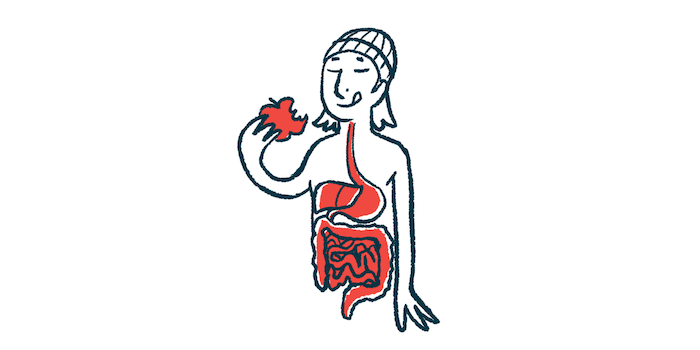Low Protein Diet May Lead to Bone, GI Problems for Women With hEDS
Low protein intake may also have effect on metabolic health and muscle mass
Written by |

Young women with hypermobile Ehlers-Danlos syndrome (hEDS) or hypermobility spectrum disorder (HSD) have low bone mineral density and significant gastrointestinal issues, a study has found.
These complications may be linked to lower protein consumption that has a lasting effect on bone health, the researchers suggested.
The study, “Assessment of Gastrointestinal Function and Its’ Effect on Bone Mineral Density and Body Composition in Hypermobility Spectrum Disorder and Hypermobile Ehlers-Danlos Syndrome,” was published in the Journal of Clinical Densitometry.
hEDS — the most common form of EDS — and HSD are rare disorders affecting the connective tissues. Typical symptoms of both include overly mobile joints (hypermobility), unusually stretchy skin, and chronic musculoskeletal pain, meaning pain in the muscles, bones, and joints.
Beyond problems with the skin and joints, patients living with EDS experience other symptoms, including gastrointestinal problems, although these are not in the diagnostic criteria for hEDS.
People with hEDS or HSD sometimes have low amounts of calcium and other minerals in their bones, called a low bone mineral density (BMD), which makes bones weaker. While the direct cause of this isn’t clear, it is possible that a lack of physical activity due to musculoskeletal pain, muscle loss, and gastrointestinal problems associated with their disease might contribute to low BMD.
Study investigates GI issues, body composition, diet, bone mineral density
A team of researchers in New York set out to investigate the relationship between gastrointestinal symptoms, body composition (i.e. muscle and fat), diet, and BMD in people with hEDS/HSD compared with healthy people.
Overall, 36 pre-menopausal women were included in the analysis, including six with hEDS, 12 with HSD, and 18 healthy participants. The mean age of patients was 28.2 whereas the mean age of healthy women was 28.1.
A technique called dual-energy X-ray absorptiometry was used to measure body composition and bone mineral density.
No differences were observed between groups in body mass index (a measure of body fat), body fat percentage, or lean body mass, which accounts for the mass of everything in the body except fat (i.e. bones, muscles, and skin). Caloric intake and grip strength were also similar between groups.
Patients had lower BMD in the spine, and left and right femurs (thigh bones) compared with healthy controls. Greater BMD was correlated with a higher lean body mass in the arms and legs, whereas BMD of the spine was linked to lower lean body mass and body fat percentage.
Analyses from three-day food diaries indicated that while overall caloric intake did not differ between the groups, hEDS/HSD patients consumed more carbohydrates and less protein compared with healthy women.
More than half of patient (56%) did not meet the current minimum recommended amount of protein per day of 0.8 grams per kilogram of body weight.
This lower protein intake was directly correlated with worse overall severity of gastrointestinal symptoms, as measured by the Gastrointestinal Symptom Rating Scale, in the patient group. Specifically, symptoms of abdominal pain and constipation were linked to lower protein consumption.
All women in the hEDS/HSD group reported nausea, vomiting, and abdominal pain in the previous seven days.
“A deficit in protein intake may have a lasting impact on metabolic health and muscle mass,” the researchers wrote. “Strategies should also be examined on how to increase protein intake in this very sensitive population.”
Nutrition specialists may be one strategy to help patients find an ideal daily protein distribution that does not exacerbate gastrointestinal symptoms, the researchers noted.
The team suggested that future studies should further seek to investigate the effects of protein supplementation on bone mineral density in hEDS/HSD patients. Evaluating the effects of physical activity on bone health may also be important.
“Future research is needed on managing [gastrointestinal] symptoms while finding ways to restore energy balance and proper macronutrient balance,” the researchers wrote.




